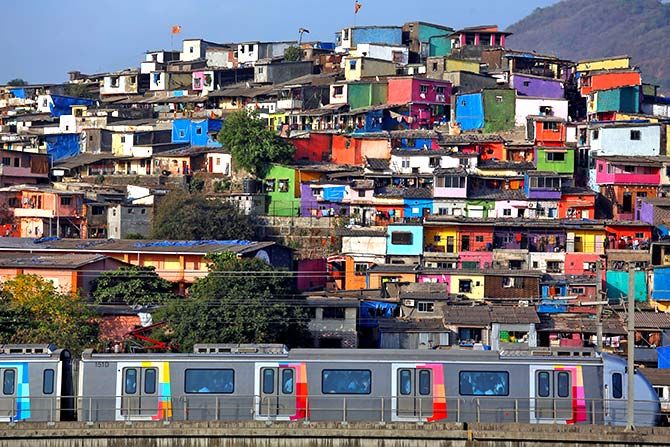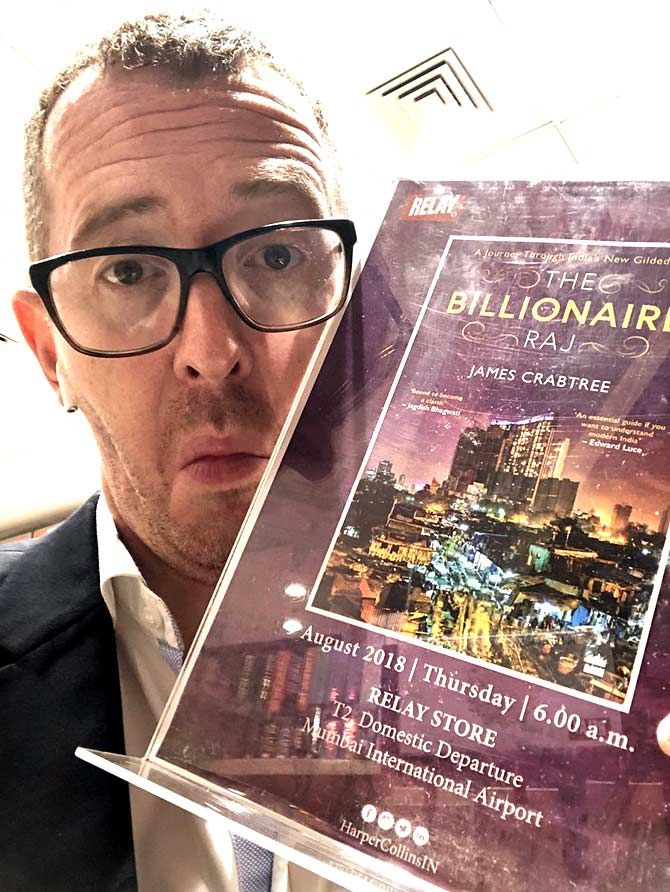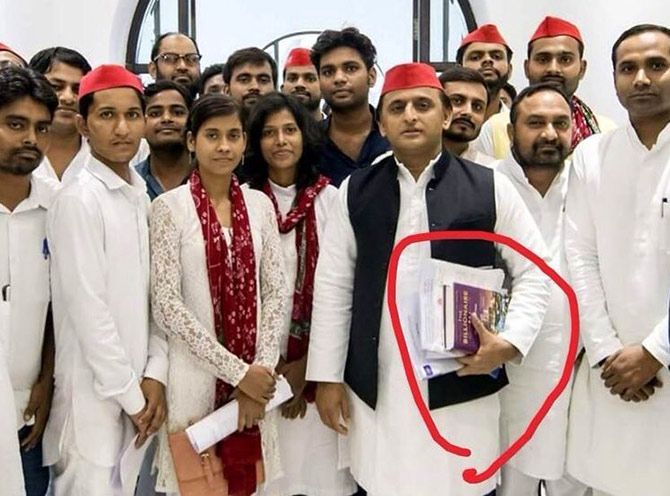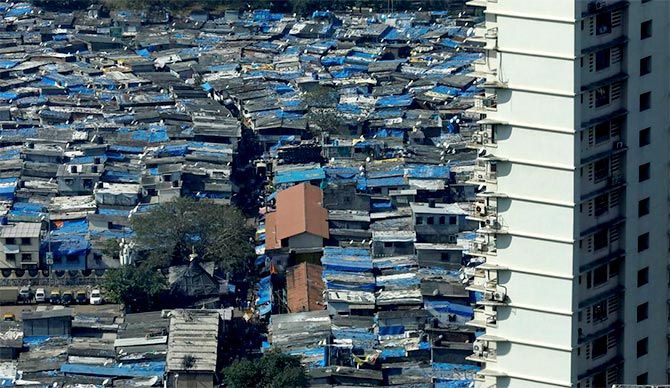'I went to slums in India which were quite destitute, where people were clearly really struggling, but typically there is a sort of sense of purpose.'
'People are hustling.'
'What that tells you is that if the country was so organised in a way to give these people opportunity, then they would make something of it.'

James Crabtree's The Billionaire Raj, a book that tracks India's place in the world economically and looks at how big India could become if it makes the right moves has already earned itself laurels.
It made it onto the long list for the Finanical Times McKinsey Business Book of the Year.
It also found a spot on former US treasury secretary Larry Summer's list of five best books on globalisation ever and figures in The Washington Post's summer reading choices.
The review have been generous too. The New York Times while stating that Crabtree should have devoted a larger section of his book to the fascinating Indian billionaires still conceded, 'The book is chock-full of profoundly revealing vignettes from various corners of India's endlessly diverse society and economy.'
"The Lutyens crowd, I think, it is undeniable that the grip on power that the traditional English-speaking elite in south Mumbai and central Delhi has over the country is slipping, for all sorts of reasons, partly to do with Modi and Hindu nationalism... India needs an elite that looks like India, not one that looks like London," Crabtree -- who considered it his business during his five year stint as the Financial Times correspondent to understand India and came to love it -- tells Vaihayasi Pande Daniel in the third segment of his multi-part interview to Rediff.com.
- Part 1: 'Very, very hard for Modi to return with a comparably large majority'
- Part 2: 'India is the swing superpower of the 21st century'

Any anecdotes about India for you that became metaphors for India?
The classic experience for a foreign correspondent in India -- and it is actually quite a good one to show you the country is improving -- is when you go to the Foreign Regional Registration Office in Mumbai.
So I end the book by talking about the airport, which is a little bit like that. Mumbai airport is quite a good metaphor for the progress that is being made to some degree.
Ten years ago it was a world-class disaster and now it is one of the best in the world. It is an indication that India can do great.
The same is true (for the FRRO). Ten years ago, when I arrived, it was an awful experience going to the FRRO. It is still pretty bad, but it has gotten a lot better.
I now talk to people who come here when it is no longer a disaster. You don't have to spend all day there in some dizzying bureaucracy. It is now a bit more efficient than it used to be.
It is not Singapore. It is getting there.
When you used to come here having to do this very painful day long registration was a thing that everybody complained about and was somehow your entry into Indian bureaucracy.
Whereas where I now live, in Singapore, that same experience is about the best in the world. To go and get your work registration documents it takes half an hour in a beautiful welcome centre, perfectly organised.
So it is not like that (in India) but it is getting better.
What about India's sense of religion?
Religion is a huge part of who India is.
How does religion in India, in your view, affect the journey India needs to be on, to reform itself?
That's a huge question. All I'd say is I think there are good reasons to believe that the values of secularism and equality enshrined in the Indian Constitution will provide a strong basis for future economic development.

Any distressing experiences in India?
People used to say that the remarkable thing about India is it is a country where every single day you see something and you think, 'I can't believe I just saw that!'
I remember once I saw a man cutting a lawn with nail scissors (in Delhi). I remember staring at him and thinking this is crazy.
Then you think about it and think what does that tell you. It tells you something interesting about the price of labour relative to capital.
It is more efficient to have someone cut the lawn with scissors then it is to buy a lawn mower.
I suppose the most distressing thing is you see people, every day, in India whose circumstances are very hard. I suppose that is hard and trying not to become inured to it is also hard -- not become kind of cynical or dismissive, trying to be empathetic to people in their situation, particularly when there are people whose circumstances you can't really begin to understand if you come from the West.
We are so extraordinarily privileged. I am tall, middle-class, English, a white guy. I couldn't be more fortunate in the lottery of life. And so you have to work really hard to put yourself in other people's shoes to not end up being a jerk about things.
My book is moderately critical about aspects of Indian life, but I always want to be conscious, you know, that I am a guest in someone else's house.
When you are a guest in someone else's house you know you wipe your feet, you talk respectfully.
I was very, very conscious both in the way I was doing my reporting and in my book that I wanted to be as a friend of the country, as I am.
My son was born here. My wife and I had our children here. We love India. We come back all the time.
India is going to part of our life for a long time. It means a lot to me that people think the book is meant in the right way.
During your posting in India did you have interactions with those who are less privileged? People living in the slums? What about that group of people struck you?
The thing that strikes you when you go into an Indian slum is the industry. And I don't mean that in the literal sense though that is often true. There are businesses everywhere.
It is the aspiration. The people who are living there often have almost nothing but they are industrious. They are working hard. It is not a situation that is generally hopeless.
You feel a much greater sense of hopelessness walking into a housing estate in Glasgow (Scotland) than you do walking into Dharavi (a large slum in north central Mumbai).
The people in the housing estates in Glasgow probably earn more than almost anyone other than the one per cent in India, in terms of annual income, but the parts of the West that are downtrodden, are really depressed.

People are more cheerful than one would have imagined?
Cheerful would be putting it too hard. But it is industrious. It is not hopeless.
If you walk into Dharavi and Mumbai -- that's a bit of a cliché all journalists go there -- but if you go to some place... I went to a few slums in India which were quite destitute, where people were clearly really struggling, but typically there is a sort of sense of purpose. People are hustling.
What that tells you is that if the country was so organised in a way to give these people opportunity, then they would make something of it.
Look at the Indian Diaspora. All around the world Indians are successful, everywhere they go.
Hindus in America are America's richest religion. Indian are the highest net tax payer of any minority.
Given the same opportunity here people would be fine. The system is holding them back.
Apart from the actually billionaire rajas, who probably have no connect with the rest of India, did you not find that India's elite, who live in south Mumbai and Lutyens' Delhi were quite disconnected from the reality of India and that that is odd?
That was my job right. I worked for the Financial Times and I didn't spend a lot of time going out into the Indian countryside and learning about the condition of people in villages.
I spent my time trying to talk to captains of industry, industrialists, tech entrepreneurs, because I was working for a newspaper that was interested in business and money and so in a sense these were people I got to know.
Add to that what I said earlier that the elites of Mumbai and Delhi and the other top tier cities are very impressive people but they are also very welcoming.
Some people you end up liking a lot and some people you don't like so much.
Typically people are nice to you. It's more (so for) being a British person in India. You would have thought for reasons of history alone people may not be very nice, but people are very nice to the English.
They are kind of welcoming and they have a sort of respect for the British that we probably don't deserve, probably less so nowadays, but still there is this kind of residual sense of mutual recognition and that just makes life easier.
People are nice to you. You are treated very generously in India. People have been very kind.
In a sense everything I know about India you can only read so much in books people have to tell you, you have to be able to talk to people.
So most of the ideas in this books someone told this stuff I am just absorbing it and trying to put it down on paper and so a lot of what I was able to do was based on the goodwill of others.
You are well to do and are you connected to the reality of India?
I don't know what it means to be connected to the reality of India. It is not clear to me to me that I or my friends or you and your friends are much more connected to the reality of somebody living in a village in Bihar.
Often I find that the industrialists are quite attuned to this world.
If you are Naveen Jindal you are stupendously rich, but you still have to build steel plants in rural Chhattisgarh.
You don' have to do anything in Chhattisgarh you can happily live in south Mumbai or Lutyens' Delhi and go on holiday to Bali.
(Jindal) might fly there on a private jet, but he has to understand the politics like a local area in rural Chhattisgarh.
So for quite a lot of these industrialists, their businesses are going to take them up against parts of India that other people don't go to.
That is not to suggest that they are fantastically attuned to the hardship of the country. But certainly compared to business people in the West, I think in India people are much more conscious of the fact that they live in a country that is being remade in which they have a kind of particular responsibility. I would give people more credit than that.
On the Lutyens crowd I think it is undeniable that the grip on power that the traditional English-speaking elite in south Mumbai and central Delhi has over the country is slipping, for all sorts of reasons, partly to do with Modi and Hindu nationalism.
And partly to due with simply the fact that the rest of the country is now modernising and so you will have different groups in Hyderabad or Ahmedabad, who are powerful and rich in a way that only Mumbai and Delhi used to be.
So the kind of lock-hold on the culture that this group -- the small elite -- used to have is slipping. That's probably a good thing.
In the end India needs an elite that looks like India, not one that looks like London.
Although it is important that the values that that elite to some degree upheld, which are the values, to some degree, in the Indian Constitution, that those continue to be upheld.











 © 2025
© 2025